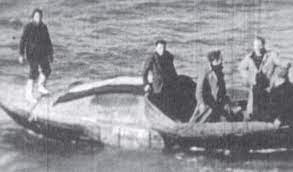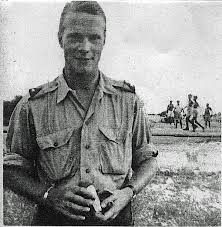Christiaan Philip Karel (Flip) Winckel (Batavia (Nederlands-Indië), April 16, 1919 – Wassenaar, September 18, 2009) was a Dutch “Engelandvaarder” (soldiers who escaped to England during World War II) and a jurist. When World War II broke out, he was studying at Leiden University.
Winckel belonged to the Winckel family listed in the Dutch Patriciate. Flip Winckel arrived in Leiden in 1939 for his law studies. He completed his preliminary exam in 1940, and when Leiden University closed, he moved to Amsterdam and registered at the municipal University of Amsterdam. He avoided signing the loyalty declaration thanks to his father, Dr. Charles Winckel, a member of the executive board of the Dutch Red Cross. Winckel secured an official job as an administrator in the laboratory of the Amsterdam Red Cross at Binnengasthuis.

In 1944, Winckel, along with others, escaped the Netherlands and successfully crossed the North Sea. The group, including Winckel, was composed of individuals like ir. Edzard Moddemeijer, radio and electrical engineer, and three Leiden geology students: John Osten, Hein Fuchter, and Henk Baxmeier. They faced various challenges, including modifying a boat named Marko and overcoming technical difficulties. The successful escape took place on February 23, 1944, and they were rescued by RAF Coastal Command.
These people were called Engelandvaarders, (literally translated as “England sailors”). A term given during the Second World War to men and women who attempted to escape from the Netherlands across over 180 kms of the North Sea to reach England and freedom. Only about one in ten were successful in the crossing, with most just disappearing in the sea. Once they reached England many joined the Allied forces to help free their country from Nazi Germany.
After their arrival in Britain Winckel requested to join the Royal Netherlands East Indies Army (KNIL) – Special Services. He travelled on the troopship SS Otranto of the Orient Line from Liverpool to Bombay. This is the very first convoy in this direction after D-Day. There they waited at Colaba Camp for six weeks before finally sailing to Melbourne on October 7, 1944, on the USS General William Mitchell, a fast Victory turbine trooper. Then by train to Brisbane and finally to the famous Camp Columbia in Wacol.
Winckel, now a 2nd Lieutenant, served as Military Auditor – Temporary Courts Martial. (He had studied Indian law/Adat law in Leiden). He managed to acquit, among other things, a KNIL sergeant who had been sentenced to death for desertion in face of the enemy. As it turned out, shortly before his alleged offense the man had been hit so hard on the head by a falling tree that he was completely dazed. The man was acquitted, which was not the norm at all at the time.

Winckel then served in Dutch New Guinea at Hollandia and Biak as a KNIL special contingent under American General Robert L. Eichelberger, commander, Australian-U.S. Advanced New Guinea Force. After Biak, Winckel became a 1st Lieutenant under Cmdr. Dirk Lucas Asjes was part of the RAPWI (Recovery Allied Prisoners of War and Internees) and landed with 120 men on September 17, 1945, immediately after the capitulation of Japan, but in the midst of the unrest on Java where supporters of Sukarno had started the struggle for independence. The highlight of this period was Winckel’s reunion with his 11-year-older brother Fritz Winckel, who had been locked up in the camp in Bandung since the outbreak of the war without the family knowing where. The fact that Flip Winckel was allowed to free his own brother was a very special outcome of his initial journey to England.
On May 26, 1944, Winckel received Royal Decree No. 9 from Queen Wilhelmina the Bronze Cross.
After the war, Winckel served in different capacities, including in the KNIL Special Services.
Source: Wikipedia
